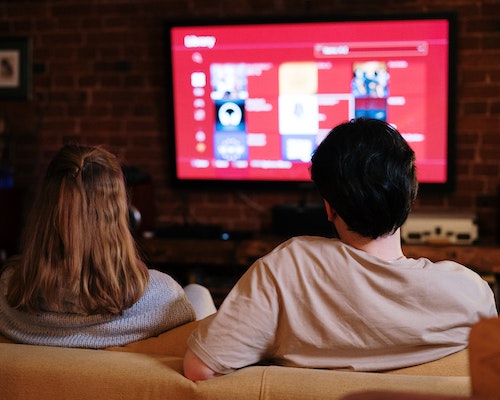It was 8 pm on a Monday night. I completed all of my homework early so that I could watch the latest episode of The Bachelor. I was excited but my mother was confused: “Your obsession with the show is unhealthy. It’s all fake.”
By Sophie Bogen
Nonetheless, I watched it that night. And I continue to, with excitement and anticipation each week. For the duration of the two hours, I attentively indulge in the cast members’ complicated interactions. That’s what keeps me coming back every Monday night.
Although many people think reality TV is overly dramatic and superficial, I differ. I believe it’s a glimpse into what romance is really like: messy and intricate. Fans of many romance-based reality TV shows like The Bachelor are also often fans of fictional romance stories like Cory and Topanga from Boy Meets World, Ross and Rachel from Friends, and Luke and Lorelai from Gilmore Girls. Epic love stories are undeniably entertaining, so it really shouldn’t matter whether or not it’s a romantic drama or reality TV love story.
The fast-paced plot of fictional romance stories portrays many of television’s most idolized relationships in an unrealistic manner.
 For instance, when Cory asks Topanga to be his girlfriend in season 3, episode 1 of Boy Meets World, the intention of the writers is formulaic. After an argument, the quick resolution between the couple illustrates an unattainable ideal of a ‘perfect’ relationship.
For instance, when Cory asks Topanga to be his girlfriend in season 3, episode 1 of Boy Meets World, the intention of the writers is formulaic. After an argument, the quick resolution between the couple illustrates an unattainable ideal of a ‘perfect’ relationship.
While the evolution of Cory and Topanga’s love is placed on a pedestal, shows like The Bachelor are criticized, despite their more accurate representation of modern-day dating culture.
Couples on The Bachelor depict a more realistic example of a not-so-picture-perfect romance. In season 24, episode 10 of The Bachelor, Peter Weber (also known as ‘Pilot Pete’) breaks off ties with contestant Victoria Fuller after falling in love. With tears in his eyes, Peter confesses to Victoria: “I just want you to know how real everything was for me…And I was falling in love with you.”
Although this was a heartbreaking moment for fans of their love story, Peter had the courage to walk away from a relationship he no longer felt strongly about. Even though the break-up between Peter and Victoria is regarded as fictitious, the disheartening end to their journey represents the reality of a break-up for most couples.
Critics of reality TV romance often scrutinize the inauthenticity of on-screen relationships, despite the relationships’ ability to convey meaningful life lessons. Iconic love stories on fictional television are undoubtedly captivating, yet, their exemplary model of love leaves the audience with unrealistic standards of a flawless relationship.
On the other hand, reality TV dating shows embrace the flaws of an imperfect relationship. For viewers, this normalizes the idea that expressing your feelings is not a limiting factor in fostering relationships.
A study conducted by the Girl Scout Research Institute surveyed 1,100 girls (ages 11-17) who were asked various questions about their engagement in reality TV. The survey found that 62% of respondents had better awareness of social issues and causes than nonviewers.
Therefore, watching reality television can be beneficial due to the various interpersonal skills and raw emotions portrayed by the cast in many of these programs.
Similarly, in the Media Psychology journal, Steven Reiss and James Wiltz tested 239 nonviewers and viewers of reality television based on 16 differing motives. The self-perceived motives favored viewers who connect with the beliefs in reality shows that they watch. The findings revealed that reality television viewers “had above-average trait motivation to feel self-important and, to a lesser extent, vindicated, friendly, free of morality, secure, and romantic, as compared with large normative samples.”
Nonetheless, the common perspective of contestants on reality TV romance programs is that their shallow morals led them to become desperate to find love and fame. The typecast idea that reality TV shows make people “dumb” or “stupid” is a common claim that critics fall short of proving.
With this claim, Hannah Jewell, a Washington Post journalist, looked to medical researchers at Indiana University in 2018 to prove this theory. Through MRI machinery, the researchers studied the assertion that The Bachelor may kill brain cells.
Although the results showed a change in emotional responses, they were unable to prove that viewers of reality TV suffered from brain cell loss. While Bachelor fans still have all their brain cells intact, the more compelling benefit of watching reality television is being able to follow the lives of the cast on social media even after their departure from airtime. The unsuccessful contestants' commitment to finding love post-show portrays their perseverance to have a happily-ever-after, like Cory and Topanga.
All things considered, the stereotype that relationships on reality television are “superficial” is untrue due to the lesson viewers learn from the embedded conflict between the cast. As much as we love Cory and Topanga, no relationship is flawless. Even though The Bachelor is a different reality than most are used to, the contestants are all on a journey to find true love, just like the rest of us.
